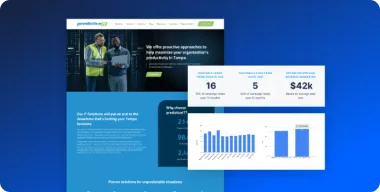As a website owner, you’ve almost certainly been spent spam messages by someone trying to sell links and promising top rankings in Google for all of your keywords. We definitely don’t recommend working with any of those spammers, but it is important to understand why links are such a crucial part of any SEO strategy and what you can do to help improve your site’s performance.
Last week, we posted a video that covers some of the basics of link building. And while our SEO team does know quite a bit about link building, we don’t have the same hands-on experience as some of those experts that have been working in the trenches building links for their clients and for themselves, so we thought it might be helpful to bring in one of those experts to give all of you some first-hand insight into the world of link building.
Brian Dean has been perfecting his SEO skills for years. By running experiments on his own sites and working as a consultant for businesses, he’s gathered a wealth of knowledge that he’s willing to share with the world over on his blog, Backlinko. I highly recommend heading over to his site and signing up for his newsletter where Brian shares his latest creative link building strategies.
In this interview, Brian was kind of enough to answer a few questions for us about link building strategies for small businesses.
Pronto: How would you explain link building and why it’s important to someone totally unfamiliar with SEO?
Brian Dean: The best analogy I’ve been able to conjure up is that a link pointing to your site is like a “vote”. So in general, the more votes you get, the higher you’ll rank in search engines (called “link popularity“). But not all votes are created equal. Links from sites with lots of links pointing to them are more powerful than links from sites without any links. So in that sense, the votes are more like the electoral college.
In the presidential, election winning a state like California is more significant than a state like Wyoming. And it’s the same with links. Getting a link from CNN.com is going to make a much bigger difference in your search engine rankings than a link from a brand new site. Considering that the quality and quantity of links are so important for SEO, link building is the process to maximize the number of links that your site gets.
What’s your favorite strategy for building links on a limited budget?
I’d have to go with guest posting.
This strategy isn’t super cheap because you do need to spend time or money on writing content and finding sites to publish your content on. But it’s cheaper than a lot of others out there.
And when done right, it can get you outstanding results…not just for link building but for generating referral traffic to your site.
For this strategy to work you do need to make sure that you’re posting on high-quality sites in your niche. Google is rearing to devalue guest post links from low-quality, unrelated sites because so many people are taking this technique too far.
A lot of link building strategies today involve outreach and relationship building. How can small business owners leverage their existing relationships to build links?
That’s true: outreach and relationship building is huge.
Small business owners should tap into people that they do business with, like clients, suppliers and people that that they hire.
Look at their websites and see if there’s a place where a link to you would make sense. Do they have a resource page with links to helpful sites? Or maybe they list businesses in a certain geographic area. Reach out and ask them to add a link to your site.
Or maybe they have a blog on their site. Ask if they’ll work a mention of your business in their next blog post.
As long as you find a specific place where your link makes sense (and ask nicely), you’ll find that almost 100% of the people you ask are happy to add your link.
If you could give small business owners who are struggling with link building one piece of advice, what would it be?
My advice would be to learn how to produce and promote outstanding content pieces on their small business blog.
When phrased like that it sounds a little bit intimidating. But like anything, it’s a skill that can be learned and taught. And it actually doesn’t take much (if any) more time than it would to bang out mediocre blog posts that no one’s going to read.
Your first step is to find out what content other people in your industry have had success with. For example, let’s say you ran a pet grooming business.
First, you’d want to Google keywords around popular topics in the pet space, like “how to get healthy nails for my dog” or “make pet food at home”.
Next, you want to see what content appears on the first page. Take any page that looks like it’s received a lot of social shares and comments and put it into Open Site Explorer. Take a look at the page’s Page Authority: a metric that measures the quality and quantity of links that page has received.
Finally, use that content as a “proof of concept” for the content that you create on your site. You can cover the same topic and make or your content better or just cover something similar.
Do you think social signals will ever have the same impact on rankings as links?
I don’t.
There are several issues with social signals that Google will have a hard time dealing with:
- First, they’re easier to game than links. It’s easy to buy 500 fake tweets for $5. And unlike links — where Google can ID phony links — they aren’t as sophisticated at determining real vs. fake social signals.
- Google doesn’t have access to all the data. Unlike a webpage (which is publicly viewable), sites like Facebook only allow Google limited access to their content. And one day they could shut off access entirely. Google can’t use what it can’t see.
- You can’t “un-tweet” something. Another great thing about links is that — if you suddenly decide a site you linked to has gone downhill — you can easily remove your link to that site. And that’s something Google pays attention to. The same can’t be done for a Tweet.
Those are just 3 examples of the minefield that social signals play as a major ranking signal. I think they’ll continue to play a small role over the next few years.
Over the past couple of years, we’ve seen Google crack down on many spammy link building tactics, which tactics do you think will fall out of favor next?
I think low-quality guest posting is already falling out of favor. As I mentioned earlier, some people take this white hat approach and turn it into a spammy link building strategy.
As long as you post on quality sites that are related to yours — and don’t use keyword-rich anchor text when linking back to your site — you can use guest posting safely to get higher search engine rankings.
Fantastic advice! Thanks so much for your time, Brian!
If you have any questions about link building, feel free to leave them in the comments below.




